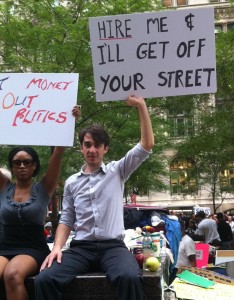Tents are completely occupying Zuccotti Park, and one could think that is to the benefit of all the protesters of Occupy Wall Street. But Josh Ehrenberg, 20, thinks otherwise.
Ehrenberg is from Rochester and has been a part of OWS for a month. He works in the comfort section of the park, which provides protesters with blankets, clothing and toiletries. As of now, he said they have a good amount of donations, but always need more warm clothes, deodorant and chapstick. What he feels the protesters don’t need is more tents. Ehrenberg said that the tents don’t really keep anyone warm, and that they pretty much only protect protesters from rain.
The biggest problem with the tents to Ehrenberg is that the tents take up so much space, making it hard for more protesters to try and occupy the park. Also, he worries that as the tents become people’s property, it is creating a sense of individual ownership and could cause segregation among protesters. But, he still believes the protesters will be sticking it out as long as possible.












